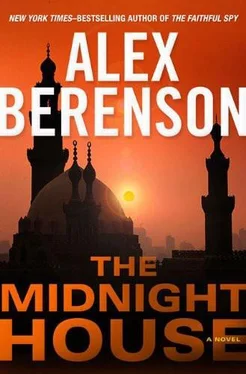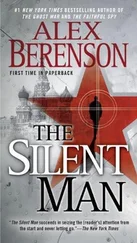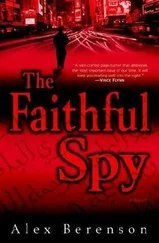Alex Berenson - The Midnight House
Здесь есть возможность читать онлайн «Alex Berenson - The Midnight House» весь текст электронной книги совершенно бесплатно (целиком полную версию без сокращений). В некоторых случаях можно слушать аудио, скачать через торрент в формате fb2 и присутствует краткое содержание. Жанр: Шпионский детектив, на английском языке. Описание произведения, (предисловие) а так же отзывы посетителей доступны на портале библиотеки ЛибКат.
- Название:The Midnight House
- Автор:
- Жанр:
- Год:неизвестен
- ISBN:нет данных
- Рейтинг книги:3 / 5. Голосов: 1
-
Избранное:Добавить в избранное
- Отзывы:
-
Ваша оценка:
- 60
- 1
- 2
- 3
- 4
- 5
The Midnight House: краткое содержание, описание и аннотация
Предлагаем к чтению аннотацию, описание, краткое содержание или предисловие (зависит от того, что написал сам автор книги «The Midnight House»). Если вы не нашли необходимую информацию о книге — напишите в комментариях, мы постараемся отыскать её.
The Midnight House — читать онлайн бесплатно полную книгу (весь текст) целиком
Ниже представлен текст книги, разбитый по страницам. Система сохранения места последней прочитанной страницы, позволяет с удобством читать онлайн бесплатно книгу «The Midnight House», без необходимости каждый раз заново искать на чём Вы остановились. Поставьте закладку, и сможете в любой момент перейти на страницу, на которой закончили чтение.
Интервал:
Закладка:
THE ENVELOPE APPEARED BENEATH his door on the third day, during the call to afternoon prayer. Inside, a single sheet of paper: 1 a.m. Northern Cemetery. Bring the camera. Nothing more.
Wells read the note twice to be sure he understood. The Northern Cemetery was a huge and ancient graveyard east of the Islamic quarter. Over the centuries, thousands of poor families had nested in the cemetery’s mausoleums and built one-room houses over its graves. Space was precious in Cairo, and the dead didn’t charge rent. Now, with fifty thousand residents, as well as paved streets and power lines, the cemetery was a city within a city, as crowded as the rest of Cairo. And so as an instruction for a meeting place, “Northern Cemetery” was strangely nonspecific, the equivalent of naming an entire neighborhood in an American city, like Buckhead in Atlanta.
Still, Wells had no choice but to obey and hope that the imam could find him. For dinner he had two plain pitas and two bottles of Fanta, the Egyptian version of his usual pre-mission meal of crackers and Gatorade, light and sugary and easy to keep down. And at 11:30, he slipped on his galabiya, tucked his camera into his backpack.
But at the door he stopped, took out the camera. He popped open the battery compartment and pulled out the flat black battery. Sure enough, a radio transmitter about the size of a nickel was taped to its underside. The bug was oldish, Russian, nothing fancy. Probably had a range of a few hundred yards, enough to help a search team track down a fugitive once he’d been treed.
Wells guessed that the mukhabarat had put the bug on the battery when he met with Hani and the imam. Wells was happy to be rid of it, happy his instincts were still sharp. Even so, finding it was a bad sign. For the first time since China, he was facing a professional secret police force. He reached a dirty fingernail under the tape and detached the bug. He’d toss it on the way to the cemetery, after he lost the tail that was surely waiting for him.
OUTSIDE THE LOTUS, the downtown streets bustled. Couples strolled side by side. A few even held hands. Discreetly, of course. A mother and a daughter, wearing matching pink head scarves, giggled as they bought Popsicles from a stooped man pulling an ice-cream cart. The lack of alcohol gave the streets a pleasant, relaxed feeling. The crowds were lively but not rowdy, the sidewalks free of broken bottles and shouting matches. And Wells walked, his hands at his sides, split from the ordinary lives around him by a wall only he could see. The curse of the spy, at once present and absent. He walked, and he wondered whether anyone was on him.
Build countersurveillance into your schedule. If you don’t have time for it, you don’t have time for the meet. Even if you don’t think anyone’s on you. Even if you’re sure no one’s on you. The life you save may be your own.
Guy Raviv, one of Wells’s favorite instructors at the Farm, had given him that lesson a lifetime ago. Raviv had striking blue eyes and a smoker’s hoarse voice and hair too black to be anything but dyed. He seemed to be in his mid-fifties, though he could have been older. My children, he called his trainees. My precious, precocious youngsters. He’d been introduced to Wells’s class as a legend who had shucked whole teams of Stasi agents in East Berlin. Wells assumed that the story was exaggerated. Instructors at the Farm had a habit of embellishing their résumés, perhaps with the agency’s encouragement. Far better for new recruits to believe that they were learning from stars than from failed ops put out to pasture.
But whatever Raviv had or hadn’t done in East Berlin, he was a master teacher, as Wells learned firsthand when he and a team of recruits chased Raviv through the crowded streets of Philadelphia on a Saturday in July. Raviv lost them twice in two hours. He didn’t run— Please remember that anything more than a brisk walk is reserved for emergencies— but he had what Wells’s linebacker coach at Dartmouth called “quick feet,” the ability to change speed and direction almost instantly. Coming back from Philly, Raviv stopped at a McDonald’s on I-95 and distributed a full tray of bon mots along with his Happy Meals.
Your first goal is to make your pursuer show himself. He knows you. You don’t know him. Before you can lose him, you have to find him. And give yourself time. Listen to the wisdom of Mick Jagger, children: Time is on your side; oh, yes it is. More time equals more moves. More moves equal more chances to make your pursuer show himself. Will you be eating those fries?
In retrospect, Wells was shocked that the agency had allowed Raviv near them. Langley had always been a tribal place, unfriendly to oddballs. In the 1980s, the agency had become especially macho, spending its energy and money running guns to tinpot Central American dictators, operations that didn’t exactly match Raviv’s skill set. Wells supposed that Raviv had survived the Reagan years by bobbing, weaving, and staying low to the ground, skills as useful at Langley as in East Berlin. He’d become an instructor around 1990, and by the time Wells’s class of recruits arrived, he had his act perfected.
After his stint at the Farm, Wells never saw Raviv again. Wells always imagined he would. He tried to look Raviv up after he got back from Afghanistan. But Raviv seemed to have shed the agency. Wells assumed he was retired, living someplace warm with his wife. If he had a wife.
“Whatever happened to Guy Raviv?” he asked Shafer.
“Good old Guy,” Shafer said. “Died. Lung cancer.”
“When?”
“You were in Afghanistan. Maybe three years ago. Don’t look so shocked.”
“You’re a sweetheart, Ellis. Real humanitarian.”
“He smoked like two packs a day is all I’m saying. Pretty good at CS, though.”
And that was Raviv’s epitaph.
WELLS WALKED toward Midhan Tahrir, the heart of Cairo, a big, brightly lit square formed by the intersection of a half-dozen avenues. A pedestrian walkway ran under the square, leading to a subway station and offering a dozen exits — a nightmare for a surveillance team. Once Wells got underground, any tail would have to stay close or risk losing him.
At the square’s northeastern corner, a waist-high railing blocked pedestrians from crossing at street level, forcing them to use the underground passageway. Wells stopped, apparently lost, as an old man walked slowly by. Wells touched his arm. “Salaam alekeim.”
“Alekeim salaam,” the man murmured, his voice barely audible above the traffic.
“Sorry to bother you, my friend. What street is this?”
“Talaat Harb. Of course. Very much so.”
“I’m looking for the movie theater.”
“The Cinema Metro?”
“Yes, I think so.”
“This way.” The man pointed up the street. “Past the next traffic circle. And then a few more streets. But I must tell you, there aren’t any more films tonight.”
“My mistake. Shokran. ”
“Afwan.” Welcome.
The man walked on. But the conversation had given Wells what he wanted. From the mass of pedestrians around him, he’d picked out five possible tails. Two men in dark blue galabiyas, their arms interlinked, walking slowly down Talaat Harb. A tall, light-skinned man in a striped blue button-down shirt, lighting a cigarette just a few feet away. Another, glancing at a shoe store as he dialed his cell phone. And a fifth, younger, drinking a Pepsi, casually watching the traffic roll by. They weren’t the only possibilities, but they were the most likely.
Trust your instincts, Raviv always said. Unless they stink, in which case you shouldn’t.
Читать дальшеИнтервал:
Закладка:
Похожие книги на «The Midnight House»
Представляем Вашему вниманию похожие книги на «The Midnight House» списком для выбора. Мы отобрали схожую по названию и смыслу литературу в надежде предоставить читателям больше вариантов отыскать новые, интересные, ещё непрочитанные произведения.
Обсуждение, отзывы о книге «The Midnight House» и просто собственные мнения читателей. Оставьте ваши комментарии, напишите, что Вы думаете о произведении, его смысле или главных героях. Укажите что конкретно понравилось, а что нет, и почему Вы так считаете.












